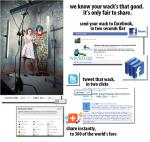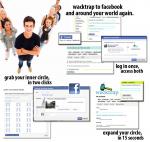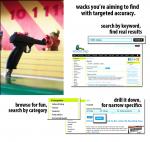What’s your story?
Share and find customer experiences
Connect with the people behind them
Wacktrap is
feedback made social
Trending Content
Creepy Google Patent Street View Zooms In Ads
by editor

Google's got a new patent allowing the online search giant to garner (technically, astronomical, Street View) ad revenues: here comes Google Street View, zooming in on window displays.
Look out world, Google Street View ad space is coming to a theater (and even its window displays) near you. Street View's also coming to billboards, posters and other advertisements like signs-and changing thos ads is all going to be performed virtually.
First filed July 7, 2008, the Google patent involving Street Views is designed around promoting ads in online mapping apps. Google's plan: first identify buildings, posters, signs and billboards in those Maps or Street Views images. Step two, and this is the crucial one, make ad space even more available by giving advertisers the ability to buy up that online/physical ad space. It's ingenious: the company can basically resell that same ad space to the highest bidder, and without the cost of physically tearing down the old ad to replace with new glue. Who says you can't sell ad space twice?
With Google at the helm, potential advertisers can replace old billboards or other signage with current, up-to-date or new advertisements. No tear-down required. Don't have a billboard of your own yet? Don't worry: looks like Google plans to offer up those available, unclaimed revenue-makers at auction.
It was wack, and the world seemed more than a bit on edge about potential invasion of privacy concerns, when Google starting offering up images of home rooftops and driveways via Google Maps. A new and, to many, invasive, technology, it took everyone awhile to get used to the Google Maps concept. Suddenly, anyone could see (at least the roofline) of where anyone else lived. A short timespan later (but light years in terms of technology) most of us have settled in or given in to the idea.
Overall, most of the world seems more used to the concept that others potentially know where we live. Some give out that info freely. Others are more guarded with such personal info, to be expected in light of crimes like identity theft. Some see filling in those blanks as needlessly providing one more piece of the puzzle to crooks or thieves.
Google Street Views could take privacy concerns to a whole new level, literally, zooming in on objects the size of posters. Somewhat fuzzy pictures of rooftops or cars in a driveway, that's one thing-but windows or posters, that's another. The new Google patent and Street View may be more concerning than what is now considered the 'OG' Google Maps: whereby Google Street View and software can supposedly zoom in and identify even specifics on a physical location like a theater.
Wack as it is, a theater marquee and even finite specifics like the theater's individual window posters can be replaced with new ad information by Google and its patent. That's right, those itty-bitty things like windows (and the content displayed therein).We're not talking rooftops anymore. Scared yet? Google Street View and its new patent means that a theater could promote a new play in Google Street View, even if the actual Street View image is totally out-of-date. Old ad, no problem, just drop in the new image. A bit eerie, to say the least. Eerier yet is potential aftermath: what, in addition to ads and their related revenue, is to come down the line with this wack new technology? What else could it be used for, even if intention is good?
How the new Google Patent is laid out: The Google patent involves a dual-step process to identify potential ad revenue and real estate in Street View images. Google software first identifies image interest points in the image, then creates features around those interest points. Google can 'augment' a region of the image, either with a link or by replacing part of a current Street View image with a new image (i.e., a brand-new ad that doesn't physically exist at the actual building or advertising location). Creepy.
Creepier yet: an entity, like a business, can buy 'ad space' for property (i.e., for a business). The only hitch is that it appears Google plans to auction off that space, so that it's unclear whether a competing business would be able to purchase ad space for your own business property. While it's logical for a business owner to consider purchasing ad space related to his own real estate, it's a little startling to find that an owner's virtual space could be sold to someone else, or a business evenoutbid on its own physical real estate location.
Wording of the Google patent includes that such Street View ad space would go to the 'highest bid'. Using a Coffee Shop as an example, the newly-approved Google patent doc includes the following:
"The link can be associated with a property owner, for example the property owner which owns the physical property portrayed. The link can alternatively be associated with an advertiser who placed the highest bid on the image recognized within the region of interest (e.g., poster, billboard, banner, etc.). Any portion of the geographic display image in which the region of interest is located can be selectable (e.g., hot-linked). For example, the image of the coffee shop can be hot-linked to an advertisement for the coffee shop."
Creepy with a side of Google-advertised Coffee Shop potatoes.
Creepiest: the patent is (as patents for the 'big guys' standardly are) a bit vague and doesn't make clear whether personal, i.e. home real estate properties that are located near current billboards or other hotspot 'ad space' (i.e., in locales known as tourist destinations with abundant signage), would be exempt from its bidding process. The patent states "The link can be associated with a property owner" but doesn't specify (to knowledge here) that only commercial/business property is slated or assigned bidding for the Google Street View ad space.
For instance, what if you own residential real estate in a metropolitan area like New York, Chicago or Los Angeles and just happen to have a bus stop (i.e., poster) visible from your living room (or, more hopefully, from your backyard)? Not unusual for highly-populated cities, right, to be sitting on top of a bus stop complete with poster advertising? Now if that home that you own happens to be the closest property address (i.e., the closest physical building address that Google Street View can link to the ad) for that bus stop, is your home real estate address potentially served up as a link for sale to the highest Google advertising bidder?
Location
SPEED UP YOUR ONLINE GROWTH
How To Wack
Take the Tour
Click on any image to start










